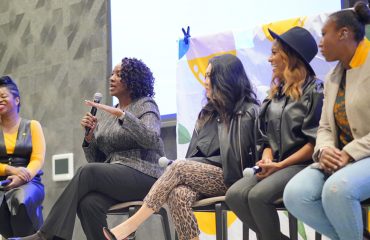What happened to Gabrielle Union is much more than a hair issue
How women of color show up in the workplace goes far beyond a hairstyle or texture. Yes, how you show up at work in terms of your hair, attire, and vernacular can be deemed as “too ethnic” or “too much,” making your white colleagues uncomfortable.
Although laws have been passed to avoid hair discrimination in the workplace, our hair is just one of the many micro-aggressions we face as a minority at work.
Being a minority in the workplace also means that when you advocate for yourself in terms of workplace safety, health, and pay, you may be deemed as difficult or problematic.
So when you take the challenges that come with being a minority in a work setting and add it to a toxic work culture, it becomes an exhausting and often unbearable experience for minorities at work.
According to Business Insider article, Americans spend an average of 90,000 hours at work in their lifetime. For minorities, that’s 90,000 hours in a work culture that was not created for them to thrive. However, we navigate these workplaces the best we can, taking on micro-aggressions and unequal pay, all while code-switching. That’s 90,000 hours of not being able to show up to work as our authentic self, and it can be suffocating.
We hear about these toxic work cultures in Silicon Valley and public relations, but in Hollywood, even your favorite A-lister can experience it, too.
It’s an experience Gabrielle Union is reported to have had as a judge on America’s Got Talent. On November 22, Union was fired from the show and days following the announcement the world learned of some of the micro-aggressions, health risks, gender discrimination, and racial biases she experienced and witnessed while only fulfilling one-year of her 3-year contract with the show. As Time’s Up and SAG-AFTRA begin their investigation of the Union’s firing, we still have not heard from Union. Her husband, Dwyane Wade’s tweets, seem to support the Vulture and Variety articles that shared the anonymous backstory to what went on behind the scenes.
What happened to Gabrielle Union is a shame, but it’s not new for women of color and is undoubtedly an issue that goes beyond black hair. What happened to her happens to thousands of black women and other women of color daily.
For Union, it’s tiring. In a Harper’s Bazaar 2016 interview, she shared what it’s like to be a Black woman in Hollywood, “That sense of being hyper-visible or invisible on sets,” says Union. “When do you stand up and point out every micro-aggression, and when do you stand down, so you’re not the angry black person all the time? It’s tiring. It feels like another job that you’re not getting paid for—that is all encompassing.”
Union’s been outspoken and unapologetic for a long time, especially about what needs to change for black women in Hollywood. I guess AGT was not prepared for a judge to be vocal about things when the cameras weren’t rolling, but Union was never the one to stay silent. Here’s why our appearance, speaking up and not having an ally can a work culture even more toxic for black women.
Hair shouldn’t be an issue at work
Ask any black woman to share a workplace hair story, and they’ll have one about people touching their hair without permission or making remarks about it. Despite California being the first state to pass the CROWN Act, Union received memos of her rotating hairstyles of being “too black” for AGT audiences. The CROWN Act is a law passed to ensure protection against discrimination based on hairstyles by extending statutory protection to hair texture and protective styles in the Fair Employment and Housing Act (FEHA). Hair is just one of the focuses of discrimination and micro-aggressions black women face at work. There’s fears and penalties that our natural hair will prevent us from getting a job or promotion. The few times that I did not straighten my hair for an interview, I remember how nervous I was about how I would be perceived. I did not want to give a prospective employer a reason not to hire me, but in reality, my hair should not have been an issue.
Speaking up has its consequences
It seems like Union and employees on the set of AGT kept well-documented reports on workplace incidents, but sometimes your receipts won’t help your case when people are protecting the powers that be. According to the reports, Simon Cowell asked Union not to report workplace incidents to executives, but to report them to him. Cowell was the very person Union had grievances with why wouldn’t she report them to the network. However, reporting on senior leadership won’t always keep your job safe or your information secure. The top reason why people don’t say what they see is that the fear of job loss and they don’t think anything will be done. Most minorities can’t afford to lose their jobs, let alone quit them despite how toxic their work environment can be. Going against Simon Cowell, who makes NBC good money, is a risk that Union took, but for the incidents to leak in the news is pure bravery. Union has the potential to lose out on working or developing projects for NBC or other networks in the future. It’s a penalty she and other women face when they stand up for what’s right.
Who’s going to have our back
Also I feel important to mention our problems on the Greys set and every set has them…some kind of issue …there’s lots of people in a workplace.. point is… exec producers and the NETWORK @abc cared enough to help us make change support is crucial.
— Ellen Pompeo (@EllenPompeo) November 28, 2019
Union wasn’t the only judge who was fired from AGT. Julianne Hough was the other woman on the panel of judges who was also released from the show. However, Hough has yet to support Union and advocate for her openly. Instead, she has spent her time denying that the workplace culture was toxic despite two sources revealing the micro-aggressions that Hough faced while on set. Hough is slated to have two upcoming holiday specials with NBC, and she’s protecting herself with disregard to her privilege. Another issue women of color face at work is sponsorship and advocacy. When facing adversity, women of color often stand alone. We aren’t able to rely on our white counterparts to stand with us or for us. Hough left Union high and dry.
this is a teaching moment..It’s important..white girls I’m talking to you..whether you truly understand what racial injustice is or not..that you stand with your sisters on the front lines. Don’t cut side deals & don’t not get involved because it isn’t your issue..because it is — Ellen Pompeo (@EllenPompeo) November 28, 2019
Instead, Union has received great support from fellow actors Ellen Pompeo and Debra Messing, who shared twitter threads on why all women need to support Union in the fight for better work environments. Their support is necessary, but imagine how much more powerful it would be if Hough lent her voice.
Women of color have to choose daily what battles they will fight. Do we stay silent, or do we stand up for what’s right? Either way, we face a penalty to carrying an unjust load or losing a way to make a living. The system may not have been built for us, but there’s a testament to the strength of women of color who face workplace adversities every day. Put some respect on names and our checks.
Image pulled from FoxNews.com






